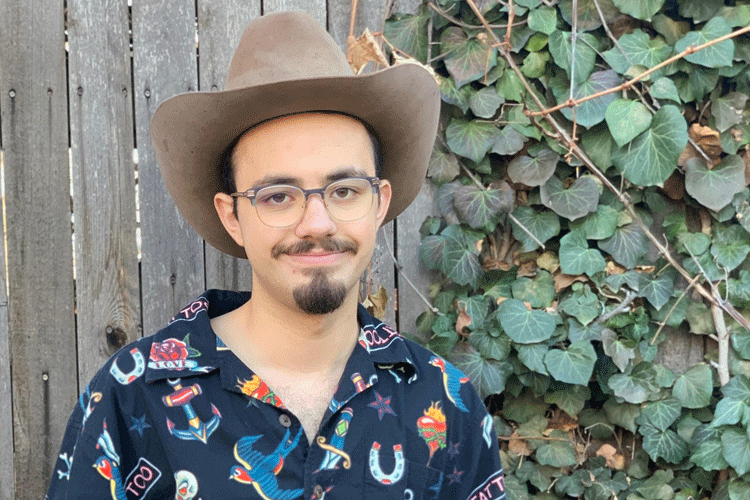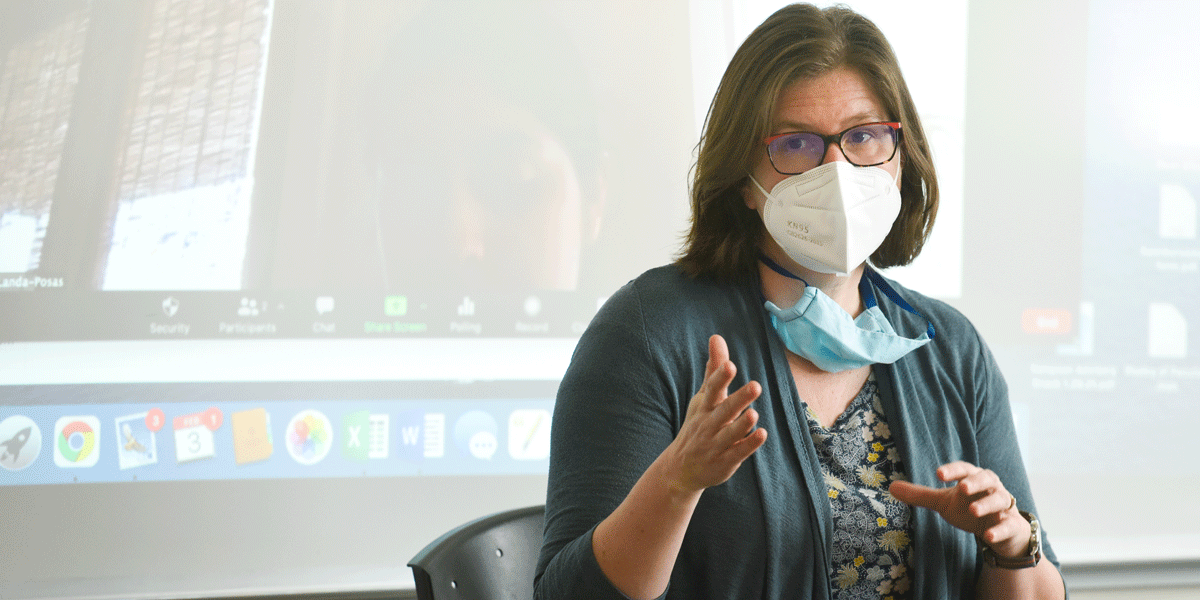
Junior Adie Williams likes writing so much she does it in her free time—fantasy, science fiction, screenplays, short stories.
“It’s a nice break from analytical writing,” she says. “You get to be creative and have more freedom.”

Senior Andy Guevara says he has an “active imagination,” but he didn’t always know how to give a “vague concept” the structure to make it cohesive and interesting.
“I was getting stuck on taking an idea and making it into art,” he says. “I took the class to have the tools to confidently take the ideas in my head and make them into stories.”
“The class” he’s talking about is Fiction Writing, a Colorado Academy Upper School honors course first developed by English teacher Emily Perez six years ago. The class has grown to be so popular that Perez shares teaching duties with Ross Holland to meet student demand for multiple sections. Both Williams and Guevara enrolled during the second trimester.

“Our students have so many different influences—internet, literature, videogames—so many storytelling mechanisms in their lives, and they are consuming stories all the time,” Perez says. “In this class they have the opportunity to not just respond to literature, but to create it. They can tell their own stories.”
“In some ways, this course resembles an art class more than an English class,” Holland adds. “It’s not so much about analysis, as it is about craft. And it’s incredible what students are capable of doing.”

Learning the tools and the art of critiquing
The class starts the trimester by reading a lot of short fiction, with an eye on “emulation,” Holland says. “They are learning the tools.”
“We ask students to examine how authors use basic story elements like plot, character, setting, conflict, tone, dialog, symbolism, structure, foreshadowing,” Perez adds. “We want them to pay attention to the essential components of a story, as well as the different techniques authors use.”
Then the teachers ask students to take those tools and go to work, creating a single original long story.
Williams wrote a screenplay about a 1970s-80s rock band, “The Rioters,” that would eventually become one of the most famous bands in the world. She alternates between the present and flashbacks, as each member of the band is interviewed about their history and the band’s tragic split in 1986.
“Everyone in the class has a really creative mind,” she says. “When we get together and share what we are writing, I love hearing the other work.”
Guevara’s “big story” is about a pit crew worker at the Indianapolis 500, who turns out to be a gambler with some addiction issues. On the day of the big race, he steals the car he’s working on, and, Guevara says, “things go downhill from there.”
“When we critique each other’s work, you can see the ‘CA politeness’ at work,’” Guevara says. “It’s wonderful, because people are careful with their comments, and by that, I mean, ‘full of care.’”
“The workshop process in this class is built around giving and receiving constructive criticism,” Holland explains. “No matter what line of work they go into, they will need to learn how to handle criticism and how to give helpful criticism to others.”
“Each student is on their own journey, but they help each other with peer review,” Perez says. “They have such avid imaginations, and what they produce is varied and interesting. It gives me faith in the power of the human mind.”

The very serious writer
Senior Jordan Davidson wrote a significant chunk of her first fantasy novel in the Fifth Grade, so it shouldn’t be a huge surprise that she walked away with a National YoungArts Merit Award for Novel Writing in her Senior year. The National YoungArts Foundation selects the most accomplished young artists in visual, literary, design, and performing arts from a competitive pool of applicants across the country.
Davidson is auditing Perez’s Fiction Writing class (an “amazing experience”), but with the perspective of both writer and instructor. Last summer, for her Senior Community Impact Project, she taught a novel writing class for Denver Writes, an organization that encourages young people to try creative writing. Most of Davidson’s fellow teachers were elementary and high school teachers.
“I had shadowed at their summer camps in the past,” she says. “I had an idea, I wrote a proposal, and next thing I knew, I was a teacher.”
Davidson is in rewrite on a 310-page novel she finished during her Freshman year, Every Single Name, which she says takes place in a “dystopia centered on gender.” She has an “epic fantasy novel” in progress—it’s at 286 pages. And she’s about 70 pages into a “supernatural murder mystery with an unreliable narrator.”
“I have so many stories in my head,” she says. “I am on the Girls Swimming Team, and while I swim, I watch a movie of my own creations.”
Davidson is also writing a series of short stories based on the writing style of classic writers, a longstanding composition exercise she defends.
“If you have read Milton’s Paradise Lost, you know it was inspired by Virgil’s The Aeneid,” she says. “When you are in Kindergarten, you have a limited vocabulary, but as you go to school, you grow your vocabulary. It’s the same with writing. As you practice more styles, you develop your own style.”
Given her passion for writing, you might expect that Davidson plans to make it a career. But although she “hopes to be published,” she says, “I hope to do other things as well.” On her list—attending law school with an eye on pursuing a legal career with the U.S. Judge Advocate General’s (JAG) Corps.
Her ambitions reinforce Perez’s belief that writing fiction—telling stories—will serve CA students no matter their professional path. “Every line of work involves being able to communicate some sort of story,” Perez says. “Whether you are telling the story of your company, about your client, to your patient, you will use storytelling skills to be more effective, to achieve an outcome, in both your personal and professional life.”
Enjoy some writing samples
From Jordan Davidson’s short story “No Equal Price”
“In Nereseye, the markets stretch for ten miles. Stall after stall, seller after seller, auctioneer after auctioneer: all make their nests under awning shadows breeding dawn to dusk, morning to evening, and moonshine to ink nights where no light but oil lanterns burning human fats permeates the thick shroud of blackened velvet. There are upper layers and lower layers. Just underneath the sky, winding staircases connect fruit stalls and silk weavers and painters and glassblowers, but deeper into the market, the clientele diverge from the ordinary. The goods bleed from lovely to deadly. The prices are no longer limited to coins and paper. At the first stall, a woman debates the price of leather shoes. In the 204th, a boy pickpockets his father as they stand together, buying poison. Thirty stalls later, a woman showcases little pocket dragons that are scarred where the chains hit them. And at the very bottom of the market, Corentine sells souls.”
From Adie Williams short story “Fish Tank”
“Crap! Crap! Crap!” Elena silently whispered to herself as she tried to cover up the hole from the now cracked open fish tank in her headmaster’s house. Luckily, she had locked the door to the bathroom, so no one could come in.
She frantically searched for some towel or some Band-Aid that she could use to cover up the hole. The only problem is that whenever she would leave the fish tank, the water would leak everywhere. If she stepped away from it too long, she would have to explain to her headmaster how there were a pile of dead fish in a once full fish tank, and now she would probably have to pay for the water damage she had caused to her expensive marble floor.
The clock was ticking and the fish tank was about to hit its halfway mark. Elena’s hands were starting to get slippery due to the water, and she didn’t have that much time until someone would want to use the bathroom. Of course, just like that, Elena heard someone knocking on the door.
“Just a minute!” she yelled back a bit too harshly. Who could blame her? She was trying to prevent herself from committing fish homicide.
From Andy Guevara’s short story “Fastlane”
Before he knows it, he’s behind the wheel of the rattling Mustang, feeling the electric warmth from engine to steering wheel zap his senses to the road, and, with a clean focus and clean ignition, the car no longer skids as it accelerates. It runs perfectly, smooth as ice, and with a kick like lightning, as it begins to tack on speed, the sensation of cool air beginning to slap his cheeks through the open window as the sound of a satisfied engine accompanies it, like thunder and lightning.
“Like the fury of God,” he thinks to himself, turning around the first bend with one hand loose on the wheel.
As he nears what he knows by heart to be the final turn onto the final narrow straightaway, he now begins to see what he can make out as a checkered flag, pinned sturdily on the middle of the bar looming above the finish line. He purposely lets his foot up on the gas, feeling the car begin to roll at a more leisurely pace, allowing him just enough time to take in all the intricate, messy detail of the stadium around him, of his home, empty yet springing full of life. Surrounded by white, yet more vibrant than any color show any drug could give him.
He focuses on the stained metal bleachers, the folds in the chain link fence surrounding the track, the half-opened garage door that used to belong to him, and the stark, white line painted mere feet before his car. This, he knows, is perfection.
